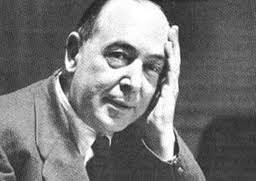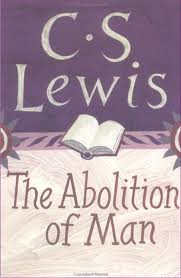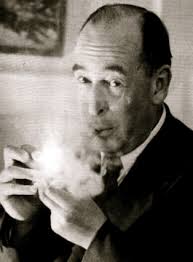by Christopher Perrin, PhD | Jun 12, 2013 | Articles, Uncategorized

I just posted an article about C. S. Lewis’s book The Abolition of Man—which you can see on this blog. Then I watched the video interview of Edward Snowden, the whistle blower of the controversial Prism surveillance program run by the NSA.
I won’t summarize all of the arguments of Lewis’s book, but he does set forward the thesis that new technologies that enable “man’s power over nature” turn out to be not to be the power of “man” generally, but rather the power of a few men over many other men.
The technologies that Lewis had in mind in 1947 were such things as the airplane, the wireless (radio) and contraceptives. Today, no doubt he would mention computers, smart phones…and the internet. These technologies do in fact bequeath power—power that most of us enjoy, like the power of emailing a friend, or listening to The Brother’s Karamazov, or checking our bank account–all while riding a bus, train or taxi (and even on some airplanes).
The power of these technologies are increasing rapidly, and while they may bless the man on the street, they also bolster the man at the bureau. We trust that our governmental agencies like the FBI, CIA and NSA use these great powers well, for our welfare and safety. If we ever suspect that they are using these powers to control, contain and condition the man on the street…well we become a bit nervous and edgy. The same technology that enables the NSA to track a potential terrorist, enables it to track me… a potential dissident. But our government wants (even encourages?) dissidence, or political free speech even of those critical of government policy. Right?
Lewis notes that when a culture has jettisoned objective value (what he also calls the Tao)—real, knowable truth and goodness—then gradually the way it wields power shifts from serving people to conditioning them to act the way the power-holders think best. And what a power-holder thinks best is not determined by an objective standard of what is right and good, precisely because such standards have been rejected. How then to do the power-holders make their decisions? They do what they please—that is to say they follow whatever impulses come to them as the strongest. These power-holders themselves may become what Lewis calls “Conditioners” and “man-moulders:”
They are, rather, not men (in the old sense) at all. They are, if you like, men who have sacrificed their own share in traditional humanity in order to devote themselves to the task of deciding what ‘Humanity’ shall henceforth mean. ‘Good’ and ‘bad,’ applied to them, are words without content: for it is from them that the content of these words is henceforward to be derived.

Could it be that immense power in the hands of few, in a culture without objective value will lead to man-moulding policies that seek to shape citizens into conformity with the prevailing ideals of those exercising this power? Is controlling and conditioning citizens not a great temptation to those possessing power—but no traditional morality? Lewis thinks that these amoral men are not bad men, because they have ceased to be men at all:
It is not that they are bad men. They are not men at all. Stepping outside the Tao, they have stepped into the void. Nor are their subjects necessarily unhappy men. They are not men at all: they are artifacts. Man’s final conquest has proved to be the abolition of Man.
Yes, but can’t we take solace in knowing that these power-holders are going to treat us fairly and well (certainly not as artifacts)? Surely, the great majority of people in these agencies will act for our good, or at least the common good. Lewis, I think, would qualify his answer. To those who hold to objective value (the Tao), we may expect some reasonable degree of benevolent treatment. But what should we expect from those who have rejected objective value?
I am very doubtful whether history show us one example of a man, who, having stepped outside traditional morality and attained power, has used that power benevolently. I am inclined to think that the Conditioners will hate the conditioned.

In Orwell’s 1984, the protagonist Winston Smith (after a great deal of conditioning) learns to love Big Brother, with tears in his eyes. But Lewis suggests that Big Brother never loves the little brother, the man on the street. Neither does Orwell. The man-moulders want to control, shape and produce a new humanity, what Lewis calls a post-humanity.
This is a pessimistic note to be sure. Chesterton says somewhere that he may enjoy a lively dinner conversation with a houseguest who is a moral relativist; but he will still hide the silver at night. Can we trust the good people at the FBI, CIA and NSA? Are they good people? Are they even people?
Finally, do we regard even Edward Snowden as good? If so, by what standard? Watch as most commentators call him either good or bad, but without appealing to any clear standard of objective truth or goodness. The testimony of Snowden himself doubles the irony, as even he does not appeal to any clear standards either. His view of the human good life seems to be the common “live and let live” as every man sees fit. Freedom to many American is now freedom to do as we please and create our own “morality.” Why can’t the folks at the NSA do the same? We all live by…impulse.
I have no way of proving this thesis, but I think that roughly half of all American have rejected objective value, and we are the midst of living out the consequences of this rejection in a thousand ways. Could it be that half of the people working in the FBI, CIA and NSA are themselves without a polished moral compass? We may call for investigations and committee hearings and protest loudly, but until we return to the Tao, we will have no basis to criticize or demand reform. Instead we will pit the impulses of the man on the street against the impulses of the man with the power, with no doubt as to who will win.
by Christopher Perrin, PhD | Jun 12, 2013 | Articles, Book Reviews


The Abolition of Man–A Review for Classical Educators
C. S. Lewis
The Abolition of Man was first published in 1947, just two years after the end of the second World War, after a great deal of abolition indeed. Lewis’ book, however, is not about man’s abolition by bombing and battles, but by grammar books and teaching methods. Eventually he does address propaganda (think Nazi propaganda) and conditioning as the eventual teaching method employed by a controlling state.
The Abolition of Man is one of C. S. Lewis’ smaller books. It is not, however, a small read. In this little book, Lewis seeks to swim upstream into a very brisk current, and one feels the pressure of that fight and the strong push against Lewis’s thought that exists everywhere today, as it did a generation ago when he wrote it.
When I read The Abolition of Man—and I have read it some five times—I find myself in the water with Lewis, kicking for all I am worth. Then occasionally I feel myself sliding downstream, for modern thought about education and “values” has a pull on me at times. The essence of his book is straightforward: there is a real, knowable world with objects that merit our blame and praise. At one place Lewis calls this the doctrine of objective value, though he also uses “The Tao” for shorthand.
How can that seemingly self-evident truth make for such a hard, brief book? Well for one this doctrine is attacked indirectly at every side so that we have been conditioned to resist it; secondly the denial of this doctrine leads to several ideas and practices that at first, don’t seem related, but in fact are. Finally this book is a hard read because we need its wisdom so much, but have employed it so little. Lewis makes a compelling case for cultivating the affections of our students, but we have largely taught our students the way were taught—too often encouraging our students to invent their own moral universe.

Lewis makes an argument for objective value, not by quoting biblical texts, church fathers or theologians, though he could. He does not quote philosophers of aesthetics, though he could. He appeals rather to the universal consensus of the major world religions and moral or ethical philosophy. Though he is a Christian, he makes an appeal merely as a theist, pointing out that theists of all kinds recognize and confess that their exist objects in the world (like mountains, trees, sunsets, waterfalls) and real human qualities (like courage, generosity and self-sacrificing love) that merit our praise and accompanying emotions of gratitude, admiration and love. As well, the universal tradition recognizes and confesses that there are some objects in the world (like deformity and destroyed landscapes) and some human qualities (like thievery, lying and cowardice) the merit our blame and accompanying emotions of revulsion, anger and sorrow.
If you assent to this doctrine of objective value, you may hold to it on rational grounds as you think about it just now. But isn’t beauty in the eye of the beholder? Do you confess (at times) “to each his own” and “live and let live”? Are not your reactions to many objects and qualities actually—your reactions? They may not be my reactions, for I am a different person than you with a different background, different training, different assumptions and preferences. We both see the storm approach and lightening strike. “The glory of God and his power!” you may say. “No soccer game today!” I may say. Are not “value judgments” largely (or at least significantly) subjective? If you feel the force of this suggestion, then you are in common company, first because we have all been conditioned to think that all value judgments are subjective and second because there is some truth to the suggestion (we all bring personal biography to our assessments in varying degrees). The truth in it, combined with our incessant conditioning (which distorts the truth in it) makes reading Lewis’ book a challenge for many of us.
For a classical educator, things can get more complicated yet, when we read that classical tradition from Plato onward tells us that we must cultivate the affections and sensibilities of the young to love that which is lovely even before their age of reason. This is truly alien to our culture: we must train the emotions of children to love the good and beautiful and hate the bad and ugly. What? Isn’t this indoctrination? Isn’t this imposing our view of what is true, good and beautiful on someone else—and a vulnerable, impressionable child at that? Don’t we need rather to encourage the young child to seek out her own preferred good and bad things, find her own style of beautiful and even her own truths? How dare we stunt or destroy this child’s freedom to choose her values and become what she wishes!
Well Lewis, Plato, Aristotle and Augustine all say that we should do precisely that. The true, good and beautiful are real and knowable and should not only be presented to children, but they should be encouraged to love the true, good and beautiful. Their emotions should be cultivated so that they blame and hate the false, bad and ugly as well. Are you kicking upstream? Slipping a little?
Now note the related implications. If you accept the doctrine of objective value and you are a teacher, should you not regularly show forth what you regard as universally true, good and beautiful objects and acts? Should you not seek to “order the loves” of your students and exhort them to flee disordered loves for those things that are not true, good and beautiful? Is there anything beautiful in your classroom—or your manner of speech? Are you full of admiration and praise, and then in proper measure full of blame and critique? Or is everything you teach left in a mush for students to sort out and think as they wish?
Because we have been conditioned to resist calling something truly lovely and then loving it, we often lack the courage to praise, extol, admire and praise. We also lack the courage to blame the ugly, despise the lie, flee the immoral. We have become humans without robust emotion, without conviction, without affections, without heart. In Lewis’s words, we have become men without chests.
But the implications of the doctrine of objective values travel in another direction too. If one rejects this doctrine, what happens to education? How will we teach? Well wittingly or not, certain things follow, or eventually follow. If all value judgments are merely subjective, then we merely describe our feelings when we make such judgments—which amounts to nothing particularly profound. Thus when our student Susan says, “That horse is beautiful” she merely states that she has certain pleasant feelings when she looks at the horse, but says nothing objectively real about the horse. What this does to teaching we have all seen and experienced. Teaching to a large extent becomes a group exploration of our individual reactions, responses and feelings, often celebrated as our individual, autonomous freedom. Instead of celebrating something as universally lovely, we celebrate the individual, free student and his opinions; each child is a unique snowflake (just like every other student). What we don’t realize is how profoundly this view has affected us. Do you feel the current? Don’t we all want to tell our children they indeed are unique and wonderful? Aren’t virtually all their ideas to be admired and encouraged? Don’t you want to view your own ideas, inclinations and opinions in a similar way? We have been carried down this river for many years.

If a teacher does not believe in object value, it does not mean that he won’t teach values. Lewis argues that the teacher who denies such values will in fact teach a very clear set of values—and they will be the prevailing values of “his set” the assumed values of the modern establishment of which he is a part. Even the denial of objective value is itself a value after all—a confessed common good. Lewis’ point is that all humans will hold to universal values—even those denying them. Such values will be hidden and assumed by such teachers, however.
Lewis concludes his book, by pointing to an ominous implication of rejecting the doctrine of objective value. If there is no objective value, then our educators will eventually become our conditioners, conditioning us to states of mind convenient to the aims of those in power. It will employ pervasive propaganda and various forms of coercion. There is simply no other means of appeal to persuade people to a course of belief, action or behavior. If there is no objective value, and we are unique and free to feel as we wish, how will we ever act in concert toward the same ends? A million autonomous snowflakes will not drift into a civilization. If there is to be a cohesive society (without objective value) then it must be conditioned and forced. A state-sponsored indoctrination follows in which humans are manipulated into serving the state’s interest even if this means the abolition of the chest and heart of man, or the abolition of man himself.
The subtitle of Lewis’ book is “How Education Shapes Man’s Sense of Morality.” We educators are indeed shaping the souls of humans beings, shaping them to love one thing or another. As we read, and re-read this profound little book, we should pay attention to the way in which our own poor education has shaped our sense of morality—our sense of what is true, good and beautiful. And since we are swimming against the current, we should do so together and kick, kick, kick.
Questions for educators:
- Are you reluctant to praise the true, good and beautiful before your students?
- What “hidden” values do you assume that come through indirectly in your teaching?
- What are the hidden values in your school culture and community?
- In what ways does the subjectivist view of morality linger in your teaching or school community?
by Christopher Perrin, PhD | Jun 3, 2013 | Videos
Here is a seminar featuring some pedagogical training I frequently give to schools and co-ops. I hope this is helpful to those seeking to learn more about classical education. In this video I present eight teaching principles that come down to us from the classical tradition: 1) festinal lente (make haste slowly); multum non multa (much not many); repetitio mater memoriae (repetition the mother of memory); songs and chants; embodied education; educational virtues, wonder and curiosity; schole and contemplation.
by Christopher Perrin, PhD | May 29, 2013 | Interviews & Podcasts
In this video clip, James K. A. Smith talks about the ways that Christian schools can become secular without really realizing it.
by Christopher Perrin, PhD | May 24, 2013 | Interviews & Podcasts, Uncategorized, Videos
I will be posting a series of video clips of an interview on classical education I helped facilitate with author and philosopher James K. A. Smith (Desiring the Kingdom, Imagining the Kingdom). The audio of this interview was posted over a year ago on this blog–now we can post the video too. Dr. Smith is compelling, personal and pithy…. so enjoy.
by Christopher Perrin, PhD | Apr 30, 2013 | Articles

While at a convention this March, I talked with two homeschooling moms I have known for several years now–having seen them for successive years at this same convention in Ohio. A year or two ago, they attended one of my seminars on scholé (Greek for contemplation, reflection, leisure), ironically the root for our word for school. They surprised me by announcing that they and some other moms and formed a reading and support group that they called “Scholé Sisters.” I think I smiled, nodded my head and kept talking (we were talking about something else), but inside I was leaping about. Here was a group of very busy homeschooling moms finding regular time to slow down, read and talk about the things that matter most. Not only are they trying to do provide for schole in their homeschools, but they they are setting aside time to provide it for themselves.
Is this possible in America today? Can we slow down and really think–about anything? When I see 20 and 30-something moms earnestly seeking, reading, conversing and then acting to recover classical education in their homes and lives my heart does leap with hope. I see their kids too every year…and they are cause for hope and happiness. These homeschooling conventions, for these reasons, leave me exhausted and exhilarated, and remind me that I need my own regular dose of scholé.
Could there be a Scholé Sisters group in your future? Here is the recipe: Gather three or more like-minded souls and commit to meet together every two weeks for two and half hours. Select a great book (a classic, a book attested to be excellent). Read before gathering. Take notes and prepare questions (write in the book!). Prepare good food and drink. Choose a beautiful setting that is quiet, with no distractions. Discuss, converse, talk. Laugh. Go slow. Repeat.
For more on the meaning of schole, see my article “Learning and Leisure: Developing A School of Schole” and read Joseph Pieper’s book, Leisure, The Basis of Culture.
by Christopher Perrin, PhD | Apr 11, 2013 | Seminars & Lectures

I have started offering some “webinar” training using Google’s live broadcast service (Google Hangouts)–and so far the approach is working fairly well. Readers of this blog can access this training by following the link below to my Google Channel. Currently, I have two training sessions archived–one on how to teach the informal fallacies and another on how to teach Latin to students in grades 2-6. Here is the link to those training sessions (each about an hour long):
Christopher Perrin’s Google Broadcast Channel
Yes, everyone can now broadcast via their own channel, giving CBS, ABC and NBC a real run for their money….
by Christopher Perrin, PhD | Feb 20, 2013 | Uncategorized
Sequestration–The Latin Word De Jour

For the last few months we have been hearing a good bit about the threat of a looming sequestration that both political parties formerly approved but presently fear. President Obama has just referred to sequestration as a meat cleaver, that no one should wield. What is this dreaded sequestration? And more importantly for readers of this blog—what is its Latin roots?
Let’s start with the Latin. The Latin word sequestrum means a deposit, and the word sequester (a noun) means either a depositary or the person (a trustee) who holds a deposit between two parties in dispute, until the dispute is settled. Finally there is a late Latin verb sequestare, which means to put in the hands of a trustee or into a depositary.
So that’s the Latin. Now we can see how our English words came about… Our word sequester is a verb, though it is spelled exactly like the Latin noun. Our English verb sequester has a few connotations:
- To “deposit” yourself or another to a place of peace and solitude. Monks, for example, lead a sequestered life.
- To simply withdraw or separate as in the sentence, He sequestered himself from the rest of the party and went downstairs to the basement alone.
- In legal matters, it can mean that we “withdraw” or “separate” someone’s property or money for a period of time, often until legal claims are satisfied.
In our current political and economic debate, we are using the words sequester and sequestration in sense 3, above. Congress previously passed a bill that specified that huge sums of money (that normally would be spent) would be sequestered (held in “deposit”or “cut”) and not be spent. ABC news describes it this way: “The dreaded “sequester” amounts to across-the-board budget cuts that will strike in March barring an agreement on deficit reduction.” This form of sequestration is practically speaking a spending freeze – a freeze that is binding until congress passes a budget. Once congress passes a budget, the legal issue will be satisfied and the sequestration (spending freeze) will be lifted—the sequestration will be sequestered.
My prediction: a budget will be passed (even if after a short period in which sequestration kicks in). Neither party wants sequestration, but both will play the issue to their best advantage during another stretch of political theater. While this lamentable, we do get to play with words and learn some Latin.
by Christopher Perrin, PhD | Feb 19, 2013 | Articles
 The world begins at a kitchen table. No matter what, we must eat to live. / The gifts of earth are brought and prepared, set on the table. So it has been since creation, and it will go on. /We chase chickens or dogs away from it. Babies teethe at the corners. They scrape their knees under it. /It is here that children are given instructions on what it means to be human. We make men at it, we make women.
The world begins at a kitchen table. No matter what, we must eat to live. / The gifts of earth are brought and prepared, set on the table. So it has been since creation, and it will go on. /We chase chickens or dogs away from it. Babies teethe at the corners. They scrape their knees under it. /It is here that children are given instructions on what it means to be human. We make men at it, we make women.
–Joy Harjo, Perhaps the World Ends Here
Good educators know the importance of finding time to slow down and contemplate important truths in order to know them, and to some degree to possess them. Parents (and parent educators) also know that reflection and good conversation are critical to raising our kids well. The opportunity for good conversation should come to us daily–at the table. Is you table still the center of your home? I would love to hear how.
We rush in and we rush out. Running a household is quite a challenge, certainly as challenging as running a small business. The metaphor seems appropriate—in many ways our households resemble a business. We have budgets and inventory to manage, supplies to purchase and repairs to make. We are busy with our family business. But we all must stop to eat, and we eat at a table.
Ah, if it weren’t for our need for food, would we even slow down? But food will slow us down, even the aroma of a casserole in the oven or a steak on the grill will give us pause. The good smells, the chatter in the kitchen, the clink of plates and glasses placed on the table, they pull on each member of the family until we arrive together at one place, the table. We are hungry after all, we are human.
As the poem by Joy Harjo makes plain, we gather at the table not only to eat and live. We gather among gifts brought and prepared. At the table we acknowledge our daily need, met by the gift of our benevolent God, and we learn to thank him, faced squarely with the reality that he feeds us or we die. We learn to thank the graciousness and care of the cook who brings the food and those who set the table and who clean up. At the table we stop for a while and talk, listen, laugh and sometimes cry. Are we not civilized at the table? Isn’t it there that we learn to wait and share, to listen and pray? Are not problems solved there, our dreams for the future schemed and laid bare? Could we not say that the table is our first school of Christian discipleship? It is not there that our fathers read from the Scripture, there that we sing and pray, and there that we are instructed?
Some of us eat alone. There are practices, soccer games, rehearsals and music lessons. There are church meetings, book groups and Bible studies. Dinner is in the fridge, you can warm it up when you get home. The family should be able to eat together on Friday night, unless you have to work late again.
Jesus ordained a sacrament at a table, telling his church to eat and “do this in remembrance of me.” We meet Christ as a community at his table, when we celebrate the Lord’s Supper. Can we not remember him and each other at our own table and in a profound way make it also his? Dinner is waiting and no matter what we must eat to live.
by Christopher Perrin, PhD | Jul 31, 2012 | Articles, Seminars & Lectures
 Below is a small article I wrote when I served as a classical school headmaster… and following is an audio seminar I often give on this subject of loving what must be done. I hope it may be of some use to classical educators here and there. –CP
Below is a small article I wrote when I served as a classical school headmaster… and following is an audio seminar I often give on this subject of loving what must be done. I hope it may be of some use to classical educators here and there. –CP
I am sure that most of you, like me, have fought hard to overcome a perpetual desire to relax and procrastinate when important tasks loomed. Those of you who have never battled with procrastination–well, your problems are obviously of another sort. In college, I recall several who transformed the practice of putting things off into art. Do you remember the guy in your dorm hall who wouldn’t begin his term paper till the night before it was due–and somehow still got an A? These types make it tempting for all of us.
The etymology of procrastination is worth examining: the word comes from the Latin pro ( forward, on behalf of) and cras (tomorrow). Therefore, at its root, the word means pro-tomorrow. Remember the maxim of the slacker: Why do today what you can put off until tomorrow? In contrast, we find encouragement of a different sort that may have originated from the German poet Goethe (I am still trying verify the citation): Cease endlessly striving for what you would like to do and learn to love what must be done.
I can sure do with a little more Goethe; and I am forced to reason that my children must need his advice, too. Many voices call for our attention–and not all of them bad. Sure, there are the typical scoundrels calling for us: hours of mindless TV programs, on-line surfing and chit-chat and other forms of “entertainment” that do little to exalt our minds or souls (no wonder Christopher Wren called TV “chewing gum” for the eyes). There are some good TV programs available too–some unusually good programs on the History Channel. We must admit, too, that amidst the ocean of drivel on the internet there are some exceptionally good sites and resources. Rejecting good things for what is best can be sorely difficult–should the family stay home tonight or take off for a church service or activity?
Finding a routine helps–for the routine answers the questions before they come up. Yes, we are going for a walk this afternoon–we always do. Yes, we will start homework after dinner–that is our routine. Crafting the routine, of course, is not necessarily easy. I know many of you have great, thoughtful, tested and re-tooled routines (could you send me a copy?). Some of you with younger children (or maybe only one young child) are probably still working on crafting your family rhythm and pattern. Establishing a routine that works well is an ongoing enterprise, that keeps answering the question of what must go, stay or be added.
Once we have created a workable routine, another challenges becomes clear. How do we maintain momentum, energy, stability and peace? At least part of the answer comes from Goethe: we should love those things we must do. Once our daily tasks become beloved tasks, the routine become less routine. This, I believe, is something we can pass on to our children, like an attitude, for Goethe is encouraging a mindset not an activity. If they see some measure of joy as we cook, clean, mow and repair, they are apt to find it easier to love (in a manner of speaking) clearing their plates, bathing and doing homework. Strange as it is, they usually grow up to be like us.
Education, after all, is largely a matter of routine. Nothing is mastered without regular visitation, review and study. And education never stops. If we can, we should cast the work our students do at CCA as a labor of love, a life-long love, and we should love what they do too. Education will have its high moments, its epiphanies, break-throughs and moments of joy–much like a marriage. But the larger tranquility of a good education comes from it regular labor of worksheets, translations and reading assignments, in the same way a good marriage grows on preparing a meal, raking the lawn and taking a walk.
Once we have created a routine and learned to love it, we can also find yet even further comfort in knowing that a regular part of our routine must be to break from it. We call these breaks of routine by various names, such as “dinner out,” “week-ends” and “vacations.” These can be holy days in their own right, those special routines that are special largely because they are not daily, and because they are a ritual of celebration. And we celebrate with the most poignant joy when our work is done (the hay is in the barn, the homework is all done–let’s go to dinner). Put another way, when we work well, we rest well.
Click the play button below to have a listen to the seminar.


















